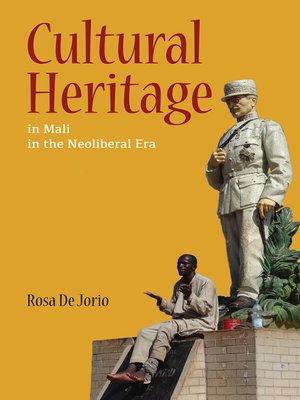Cultural Heritage in Mali in the Neoliberal Era
ebook ∣ Interp Culture New Millennium
By Rosa De Jorio

Sign up to save your library
With an OverDrive account, you can save your favorite libraries for at-a-glance information about availability. Find out more about OverDrive accounts.
Find this title in Libby, the library reading app by OverDrive.



Search for a digital library with this title
Title found at these libraries:
| Library Name | Distance |
|---|---|
| Loading... |
Up to 2012, Mali was a poster child of African democracy, despite multiple signs of growing dissatisfaction with the democratic experiment. Then disaster struck, bringing many of the nation's unresolved contradictions to international attention. A military coup carved off the country's south. A revolt by a coalition of Tuareg and extremist Islamist forces shook the north. The events, so violent and unexpected, forced experts to reassess Mali's democratic institutions and the neoliberal economic reforms enacted in conjunction with the move toward democracy. Rosa De Jorio's detailed study of cultural heritage and its transformations provides a key to understanding the impasse that confronts Malian democracy. As she shows, postcolonial Mali privileged its cultural heritage to display itself on the regional and international scene. The neoliberal reforms both intensified and altered this trend. Profiling heritage sites ranging from statues of colonial leaders to women's museums to historic Timbuktu, De Jorio portrays how various actors have deployed and contested notions of heritage. These actors include not just Malian administrators and politicians but UNESCO, and non-state NGOs. She also delves into the intricacies of heritage politics from the perspective of Malian actors and groups, as producers and receivers—but always highly informed and critically engaged—of international, national and local cultural initiatives.|
Cover
Title Page
Copyright
Contents
Illustrations
Acronyms
Acknowledgments
Introduction: Malian Cultural Heritage and Governmentality
1. Commemorating the Nation's Heroes in Mali's Neoliberal Democracy
2. Remembering the Colonial Past
3. The Women's Museum Muso Kunda: Citizenship, Gender, and Social Memory
4. The Heritagization of Islamic and Secular Architecture: Djenné
5. The Fate of Timbuktu's Sufi Heritage: Controversies around Past Traces and Current Practices
Epilogue: Further Thoughts on Governmentality and Culture
Glossary
Notes
References
Index
|"In the tradition of Michel Foucault's work, Rosa de Jorio's book represents a fascinating analysis of the politics of cultural heritage in Mali in the context of the privatization of cultural initiatives and the rise of fundamentalist Islam."—Jean-Loup Amselle, author of Branchements: Anthropologie de l'universalité des cultures
"A marvelous text. De Jorio not only discusses the cultural ramifications of 'heritage' in Mali, but considers it in the wake of Islamist and Tuareg rebellions in the north. She demonstrates powerfully how cultural heritage implicates questions of religious practice as they relate to the exercise of power."—Paul Stoller, author of Yaya's Story: The Quest for Well-Being in the World
"De Jorio elegantly shows how notions of 'heritage' have been deployed and contested by Malian politicians, by foreign NGOs and especially UNESCO, and of course by different segments of the Malian population who are always the targets and sometimes the victims of 'heritage' politics."—Robert Launay, author of Traders without Trade: Responses to Change in Two Dyula Communities
|Rosa De Jorio is an associate professor of anthropology at the University of North Florida.
"A marvelous text. De Jorio not only discusses the cultural ramifications of 'heritage' in Mali, but considers it in the wake of Islamist and Tuareg rebellions in the north. She demonstrates powerfully how cultural heritage implicates questions of religious practice as they relate to the exercise of power."—Paul Stoller, author of Yaya's Story: The Quest for Well-Being in the World
"De Jorio elegantly shows how notions of 'heritage' have been deployed and contested by Malian politicians, by foreign NGOs and especially UNESCO, and of course by different segments of the Malian population who are always the targets and sometimes the victims of 'heritage' politics."—Robert Launay, author of Traders without Trade: Responses to Change in Two Dyula Communities
|Rosa De Jorio is an associate professor of anthropology at the University of North Florida.







